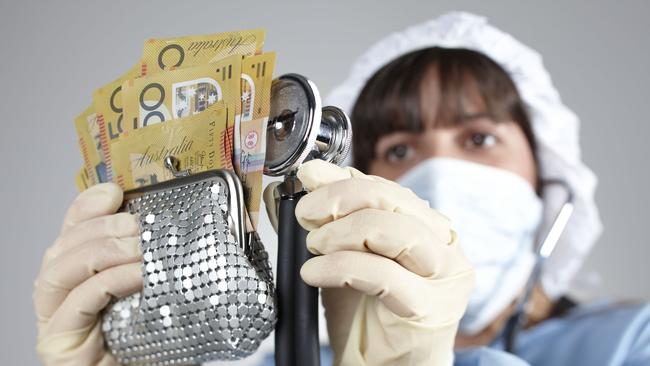Health insurance tax and penalties explained, and how you can still save money on it
Tax subsidies, tax penalties, age penalties – health insurance is so complicated and so expensive, do you really need it? Here we walk you through the health insurance basics.
National
Don't miss out on the headlines from National. Followed categories will be added to My News.
Tax subsidies, tax penalties, age penalties – health insurance is so complicated and so expensive do you really need it? Here we walk you through the health insurance basics.
Do I need health insurance?
Every Australian citizen is entitled to free care in a public hospital so you don’t have to buy health cover.
However, if you need elective surgery or you want to choose the doctors who provide your care, you may want to consider taking out private cover.
Elective surgery waiting lists in public hospitals are currently at record levels after several years of Covid surgery bans, and many people are waiting over 12 months for elective surgery like hip and knee replacements.

If you have private cover, you may get your surgery earlier. However, it’s worth noting that the number of surgeries performed privately has also plunged as a result of Covid surgery bans and the difficulties private hospitals are having attracting staff.
Also, when you use your private cover, you may be hit with out of pocket expenses that are not covered by your insurer.
Are there any penalties if I don’t take out private health insurance?
Yes. There are two penalties you could face if you don’t take out health cover.
The government penalises people who don’t take out health cover after their 31st birthday. If you decide you want to purchase hospital cover later in life, you will have to pay a Lifetime Health Cover Loading which will add 2 per cent to your premiums for every year you delayed taking out cover.
Another reason you may want to consider taking out insurance is singles earning over $90,000 (93,000 from July 1) and families earning over $180,000 ($186,000 from July 1) pay a 1-1.5 per cent tax penalty if they are uninsured.
Is it cheaper to buy health cover than pay the tax penalty called the Medicare Levy Surcharge?
Currently singles earning over $90,000 (93,000 from July 1) and families earning over $180,000 ($186,000 from July 1) who are hit by the Medicare levy surcharge will find it cheaper to pay the 1-1.5 per cent tax penalty than buy health cover.
The reason for this is that health fund premiums have risen so fast in recent years the tax penalty is actually cheaper than buying health insurance.

If you earn over $90,000 as a single, your tax penalty is $900 and the cheapest health fund policy on offer costs $1002 after the tax rebate and only covers you as a private patient in a public hospital. The cheapest Bronze policies cost $1123 after the tax rebates.
You have to earn over $100,000 a year before it is cheaper to buy health cover as a single.
If you earn over $180,000 as a family, the tax penalty is $1800 and the cheapest health cover is $2005 a year after tax rebates, and only covers you as a private patient in a public hospital. The cheapest Bronze policy is $2256 after the tax rebate.
You have to earn more than $200,000 a year before it is cheaper to buy health cover.
This tax penalty was originally meant to hit the highest income earners but the previous government did not index the income threshold at which the surcharge kicked in for many years, so the tax slug is now hitting people on less than average earnings – $94,000.
The income at which the penalty kicks in will be indexed for the first time in many year in July.
It is worth knowing you only need to take out hospital cover, not extras cover, to avoid this tax penalty.
Is there a government subsidy for health insurance and who benefits?
Over 20 years ago, the federal government introduced a subsidy for private health insurance called the Private Health Insurance Tax rebate. It was a “carrot” to encourage people to take out health cover and balanced the “stick” – the tax penalty applying to higher earners discussed above.
The maximum subsidy covered 30 per cent of your premiums when it was introduced but several years ago budget cuts meant the subsidy started to shrink as health fund premiums increased at a faster rate than inflation.
The maximum subsidy is now worth 24.6 per cent of your health fund premium if you are aged under 65.
It is worth 28.7 per cent of your premiums if you are aged 65-69 and 32.8 per cent if you are aged over 70.
The subsidy reduces as your income rises and cuts out completely when you earn less than $140,000 (rising to $144,000 July 1) as a single and less than $280,000 (rising to $288,000 from July 1) as a family.
How can I cut my health insurance costs?
b Pay for annual membership upfront on March 31 to avoid the annual April 1 premium rise.
b See if you are eligible for a corporate discount of 9-10 per cent
b If you are a couple, if could be cheaper for the man to buy a single policy that excludes pregnancy while the woman buys a single policy that includes pregnancy than if you both buy a couples product that covers pregnancy. Likewise, he might need extras cover for glasses but you don’t.

b Don’t buy an extras policy if you rarely claim because it is usually cheaper to self-fund.
Choice found the average annual extras premium for a single person in Australia is about $630, and the average cash people receive back from their provider is only $435.
b The government imposes tax penalties if you exceed a certain income but don’t have cover. If you are caught by these rules and don’t intend to use health insurance, buy a product with the biggest allowed excess $750 for singles and $1500 for families.
b Don’t buy a junk policy that only covers you for a public hospital. You are entitled to be treated fee of charge in a public hospital under Medicare.
b Seek out the best deals which could involve buying a policy for hospital cover with one supplier and with another insurer for extras.





